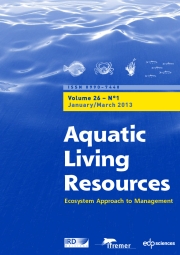Crossref Citations
This article has been cited by the following publications. This list is generated based on data provided by
Crossref.
Hop1, Haakon
Pearson2, Tom
Hegseth3, Else Nøst
Kovacs1, Kit M.
Wiencke4, Christian
Kwasniewski5, Slawek
Eiane6, Ketil
Mehlum1, Fridtjof
Gulliksen3, Bjørn
Wlodarska-Kowalczuk5, Maria
Lydersen1, Christian
Weslawski5, Jan Marcin
Cochrane2, Sabine
Gabrielsen1, Geir Wing
Leakey7, Raymond J. G.
Lønne6, Ole Jørgen
Zajaczkowski5, Marek
Falk-Petersen1, Stig
Kendall8, Mike
Wängberg9, Sten-Åke
Bischof4, Kai
Voronkov10, Andrey Y.
Kovaltchouk11, Nikolaj A.
Wiktor5, Jozef
Poltermann1, Michael
Prisco12, Guido Di
Papucci13, Carlo
and
Gerland14, Sebastian
2002.
The marine ecosystem of Kongsfjorden, Svalbard.
Polar Research,
Vol. 21,
Issue. 1,
p.
167.
Hop, Haakon
Pearson, Tom
Hegseth, Else Nøst
Kovacs, Kit M.
Wiencke, Christian
Kwasniewski, Slawek
Eiane, Ketil
Mehlum, Fridtjof
Gulliksen, Bjørn
Wlodarska-Kowalczuk, Maria
Lydersen, Christian
Weslawski, Jan Marcin
Cochrane, Sabine
Gabrielsen, Geir Wing
Leakey, Raymond J. G.
Lønne, Ole Jørgen
Zajaczkowski, Marek
Falk-Petersen, Stig
Kendall, Mike
Wängberg, Sten-Åke
Bischof, Kai
Voronkov, Andrey Y.
Kovaltchouk, Nikolaj A.
Wiktor, Jozef
Poltermann, Michael
Prisco, Guido
Papucci, Carlo
and
Gerland, Sebastian
2002.
The marine ecosystem of Kongsfjorden, Svalbard.
Polar Research,
Vol. 21,
Issue. 1,
p.
167.
Le Goff‐Vitry, M. C.
Pybus, O. G.
and
Rogers, A. D.
2004.
Genetic structure of the deep‐sea coral Lophelia pertusa in the northeast Atlantic revealed by microsatellites and internal transcribed spacer sequences.
Molecular Ecology,
Vol. 13,
Issue. 3,
p.
537.
Le Goff-Vitry, Marie C.
and
Rogers, Alex D.
2005.
Cold-Water Corals and Ecosystems.
p.
653.
Martinez, Iciar
Aschan, Michaela
Skjerdal, Taran
and
Aljanabi, Salah M.
2006.
The genetic structure of Pandalus borealis in the Northeast Atlantic determined by RAPD analysis.
ICES Journal of Marine Science,
Vol. 63,
Issue. 5,
p.
840.
FOGARTY, MICHAEL J.
and
BOTSFORD, LOUIS W.
2006.
Marine Metapopulations.
p.
271.
Exadactylos, Athanasios
2008.
Reproductive Biology of Crustaceans.
p.
91.
Ungfors, Anette
McKeown, Niall J.
Shaw, Paul W.
and
André, Carl
2009.
Lack of spatial genetic variation in the edible crab (Cancer pagurus) in the Kattegat–Skagerrak area.
ICES Journal of Marine Science,
Vol. 66,
Issue. 3,
p.
462.
Nilssen, Einar M.
and
Aschan, Michaela M.
2009.
Catch, survey and life-history data for shrimp (Pandalus borealis) off Jan Mayen.
Deep Sea Research Part II: Topical Studies in Oceanography,
Vol. 56,
Issue. 21-22,
p.
2023.
Sardà, Francisco
Roldán, María Inés
Heras, Sandra
and
Maltagliati, Ferruccio
2010.
Influence of the genetic structure of the red and blue shrimp, <i>Aristeus antennatus</i> (Risso, 1816), on the sustainability of a deep-sea population along a depth gradient in the western Mediterranean.
Scientia Marina,
Vol. 74,
Issue. 3,
p.
569.
Pascoal, Ananias
Ortea, Ignacio
Gallardo, José M.
Cañas, Benito
Barros-Velázquez, Jorge
and
Calo-Mata, Pilar
2012.
Species identification of the Northern shrimp (Pandalus borealis) by polymerase chain reaction–restriction fragment length polymorphism and proteomic analysis.
Analytical Biochemistry,
Vol. 421,
Issue. 1,
p.
56.
Pereyra, Ricardo T.
Westgaard, Jon-Ivar
Dahl, Mikael
Johansen, Torild
Knutsen, Halvor
Ring, Anna-Karin
Søvik, Guldborg
and
André, Carl
2012.
Isolation and characterization of nuclear microsatellite loci in the northern shrimp, Pandalus borealis.
Conservation Genetics Resources,
Vol. 4,
Issue. 1,
p.
109.
Jorde, Per Erik
Søvik, Guldborg
Westgaard, Jon‐Ivar
Albretsen, Jon
André, Carl
Hvingel, Carsten
Johansen, Torild
Sandvik, Anne Dagrun
Kingsley, Michael
and
Jørstad, Knut Eirik
2015.
Genetically distinct populations of northern shrimp, Pandalus borealis, in the North Atlantic: adaptation to different temperatures as an isolation factor.
Molecular Ecology,
Vol. 24,
Issue. 8,
p.
1742.
El Sheikha, Aly Farag
and
Montet, Didier
2016.
How to Determine the Geographical Origin of Seafood?.
Critical Reviews in Food Science and Nutrition,
Vol. 56,
Issue. 2,
p.
306.
Taylor, M. L.
and
Roterman, C. N.
2017.
Invertebrate population genetics across Earth's largest habitat: The deep‐sea floor.
Molecular Ecology,
Vol. 26,
Issue. 19,
p.
4872.
Azuma, Noriko
and
Chiba, Susumu
2018.
Genetic population structure of the Hokkai shrimp Pandalus latirostris Rathbun, 1902 (Decapoda: Caridea: Pandalidae) from Zostera seagrass beds in Hokkaido, Japan.
Journal of Crustacean Biology,
Vol. 38,
Issue. 2,
p.
147.
Gasbarro, R
Wan, D
and
Tunnicliffe, V
2018.
Composition and functional diversity of macrofaunal assemblages on vertical walls of a deep northeast Pacific fjord.
Marine Ecology Progress Series,
Vol. 597,
Issue. ,
p.
47.
Hansen, Agneta
Westgaard, Jon-Ivar
Søvik, Guldborg
Hanebrekke, Tanja
Nilssen, Einar Magnus
Jorde, Per Erik
Albretsen, Jon
Johansen, Torild
and
Grant, William
2021.
Genetic differentiation between inshore and offshore populations of northern shrimp (Pandalus borealis).
ICES Journal of Marine Science,
Vol. 78,
Issue. 9,
p.
3135.
Varrà, Maria Olga
Ghidini, Sergio
Ianieri, Adriana
and
Zanardi, Emanuela
2021.
Near infrared spectral fingerprinting: A tool against origin-related fraud in the sector of processed anchovies.
Food Control,
Vol. 123,
Issue. ,
p.
107778.




